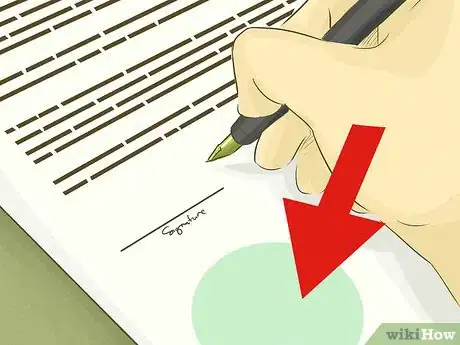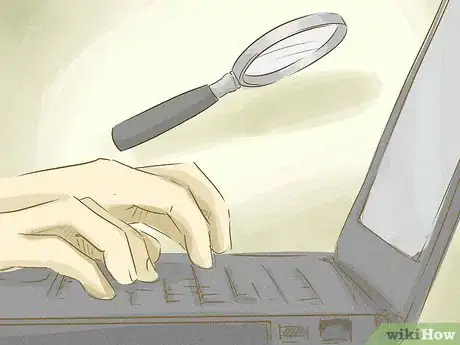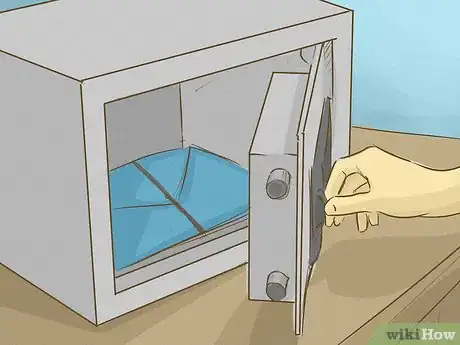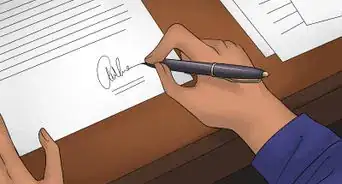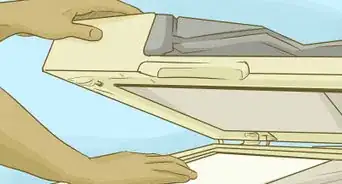This article was co-authored by Clinton M. Sandvick, JD, PhD. Clinton M. Sandvick worked as a civil litigator in California for over 7 years. He received his JD from the University of Wisconsin-Madison in 1998 and his PhD in American History from the University of Oregon in 2013.
There are 16 references cited in this article, which can be found at the bottom of the page.
This article has been viewed 63,674 times.
After writing your will, you will need to “execute” it. In this context, "executing" your will means signing it in accordance with the law, which makes it valid. The requirements are substantially the same in every state, but some states differ permit exceptions to the normal requirements. If you are writing your own will, consult Make Writing a Will Easy before you execute the document.
Steps
Executing Your Will
-
1Meet the age requirement. Almost every state uses age 18 as the minimum age for a person to execute a valid will. There are some exceptions. Review your state's requirements here.
- You can make a will at age 14 in Georgia.[1]
- You can make a will at age 16 or 17 in Louisiana as long as your will in the prospect of your death.[2]
- You must be at least 19 in Nebraska.[3]
- Some states permit minors to execute valid wills if they are emancipated by court order, married, or serving the armed forces.[4] [5] [6]
-
2Satisfy the mental capacity requirements. To execute a valid will, you must be "of sound mind." This typically means that you understand what property you have and who you would like to give it to. People can have mental illnesses or intellectual disabilities and still be of sound mind for the purpose of executing a will.[7] Your will is also invalid if you were forced, pressured, or coerced into executing it.Advertisement
-
3Make sure your will has a signature block. The signature block should include your name, the date, and a declaration that you are making the will voluntarily.
- For example, "I, John Doe, the testator, sign my name to this document, this 12th day of August, 2015. I declare that I sign and execute this instrument as my last will, that I sign it willingly, and that I execute it as my free and voluntary act. I declare that I am of the age of majority or otherwise legally empowered to make a will, and under no constraint or undue influence. Signature:_______________"[8]
-
4Have another block for your witnesses. Most states require two witnesses, while some require three. The signature block should contain a statement that the witnesses saw you sign your name to the will, as well as the witnesses' personal information and signatures. [9] [10]
- For example, "We, the witnesses, sign our names to this document, and declare that the testator willingly signed and executed this document as the testator's last will. In the presence of the testator, and in the presence of each other, we sign this will as witnesses to the testator's signing. To the best of our knowledge, the testator is of the age of majority or otherwise legally empowered to make a will, is of sound mind, and is under no undue influence. We declare under penalty of perjury that the foregoing is true and correct, this 12th day of August, 2015, at Santa Ana, California."
- First Witness
- Sign your name:___________________, Date: _____________________
- Print your name:___________________
- Address:_________________________
- City, State:_____________________[11]
- Second Witness (and third, if necessary)
- For example, "We, the witnesses, sign our names to this document, and declare that the testator willingly signed and executed this document as the testator's last will. In the presence of the testator, and in the presence of each other, we sign this will as witnesses to the testator's signing. To the best of our knowledge, the testator is of the age of majority or otherwise legally empowered to make a will, is of sound mind, and is under no undue influence. We declare under penalty of perjury that the foregoing is true and correct, this 12th day of August, 2015, at Santa Ana, California."
-
5Assemble your witnesses. Most states require that you have two witnesses, while some states require three.[12] Your witnesses must generally be competent adults. Some states permit minors to act as witnesses; witnesses in Iowa need only be age 16.[13]
- Many states do not permit you to choose witnesses who will be beneficiaries, ones receiving something under your will. If one of your witnesses is one of your beneficiaries, a court may revoke any gifts made to that witness. To avoid this possibility, choose witnesses who are not family members or anyone named in your will. If you hired an attorney to prepare your will, members of the law office staff may be willing to act as witnesses for you.
- Some states recognize signed wills in the maker's handwriting, called "holographic," which are un-witnessed wills with the "material provisions" (who gets what). Even if your state permits holographic wills, a witnessed will is harder to challenge and breakdown in court.
-
6Sign and date the formal/official will. You must sign and date the will in the presence of your witnesses. This means that both witnesses must see you sign the will. Your witnesses should then immediately sign and date the will themselves, stating that they observed you making your signature and that you appeared to be of sound mind and were not forced or pressured to sign.
- If you create a holographic will (where all of the material provisions are in your own handwriting), you do not need witnesses. Even if your state recognizes holographic wills, consider executing a regularly witnessed will and keeping your holographic will as a backup.
- If you are ill or otherwise unable to sign the will yourself, some states allow someone else to sign your will for you.[14] You must direct this person to sign the will in your presence and in the presence of your witnesses.
- A small number of states recognize oral wills. Typically, oral statements of your last wishes are only enforceable, if the bequests are less than a certain amount, and you express your wishes on your deathbed in front of at least two witnesses.[15] Mississippi, for example, requires that any gift given under an oral will be worth no more than $100. [16]
- It can be helpful, though not necessary, to have the formalized will notarized, making it convenient when your will is to be admitted in court.[17] You would sign and have your witnesses sign in the presence of a notary. The notary verifies identities of the signers of the documents, and that it was signed in his or her presence. Bring a valid form of identification, such as a driver's license or passport, to verify your identity, and have your witnesses do the same.
Making Sure Your Will is Effective
-
1Hire an attorney. Consider hiring an attorney to draft your will, or at least to review the will you have drafted. Wills with errors or ambiguities can cost families a great deal of money in legal fees and taxes, so it may be worth it to pay a professional to make sure that your will is as good as it can be.
- To find reduced-cost assistance, contact your local bar association and ask about pro bono or reduced-fee legal representation. Also meet with attorneys for a free consultation.
-
2Find a will template or form. If you can’t afford a lawyer and you have a simple estate, you can draft a will yourself. You will need a template for your state. There are many different kind of will templates, but some such as fill-in-the-blank forms and statutory wills do not come with clear instructions. Seek better options that streamline the process:
- A will book or CD. These often have downloadable forms specific to each state, and they come with clear instructions.
- Will software. The software (which you download to your computer) typically includes an interview. The interview helps customize the will to your specific needs. A key benefit of will software is that you can revisit the will and make changes at no cost.[18]
- Online will programs. Like will software, you proceed through an interview, which helps tailor the will to your needs.[19]
-
3Consult a tax attorney or estate planning professional. If you have significant assets, your estate and beneficiaries may end up owing significant estate and gift taxes. A will is one part of a comprehensive estate plan, which can include trusts, advance medical directives, and the re-titling of property to avoid transfer taxes. Even if your estate is modest, you should consider consulting an estate planning or tax professional to ensure that your wishes will be carried out upon your death.
-
4Keep your will safe. Place your will somewhere secure, like a fireproof safe, and make sure someone you trust knows how to access it. A will that goes missing or is destroyed is not very useful.[20]
-
5Update your will as needed. Don't forget to make changes to your will if you have a child, get married, or get divorced. You should also review your will periodically an remove any beneficiary who has died or done something that makes you want to disinherit them.[21]
Warnings
- This article is intended as legal information and does not provide legal advice. If you need legal advice, contact a licensed attorney.⧼thumbs_response⧽
References
- ↑ http://statelaws.findlaw.com/georgia-law/georgia-wills-laws.html
- ↑ http://statelaws.findlaw.com/louisiana-law/louisiana-wills-laws.html
- ↑ http://statelaws.findlaw.com/nebraska-law/nebraska-wills-laws.html
- ↑ http://statelaws.findlaw.com/florida-law/florida-wills-laws.html
- ↑ http://statelaws.findlaw.com/kansas-law/kansas-wills-laws.html
- ↑ http://statelaws.findlaw.com/texas-law/texas-wills-laws.html
- ↑ http://statelaws.findlaw.com/alabama-law/alabama-wills-laws.html
- ↑ http://www.nolo.com/legal-encyclopedia/sample-will.html
- ↑ http://www.nolo.com/legal-encyclopedia/how-write-will.html
- ↑ http://www.nolo.com/legal-encyclopedia/executing-will.html
- ↑ http://www.nolo.com/legal-encyclopedia/sample-will.html
- ↑ https://www.lawyers.com/legal-info/trusts-estates/wills-probate/witnesses-to-a-will.html
- ↑ http://statelaws.findlaw.com/iowa-law/iowa-wills-laws.html
- ↑ http://statelaws.findlaw.com/alabama-law/alabama-wills-laws.html
- ↑ http://statelaws.findlaw.com/alabama-law/alabama-wills-laws.html
- ↑ http://statelaws.findlaw.com/mississippi-law/mississippi-wills-laws.html
- ↑ http://www.nolo.com/legal-encyclopedia/question-does-will-have-be-notarized-28258.html
- ↑ http://www.nolo.com/legal-encyclopedia/types-will-templates.html
- ↑ http://www.nolo.com/legal-encyclopedia/types-will-templates.html
- ↑ http://money.usnews.com/money/personal-finance/articles/2014/09/19/10-steps-to-writing-a-will?page=2
- ↑ http://money.usnews.com/money/personal-finance/articles/2014/09/19/10-steps-to-writing-a-will?page=2


